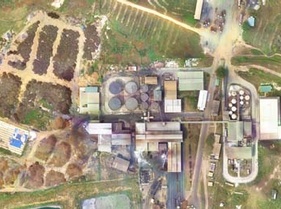
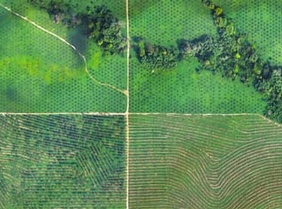
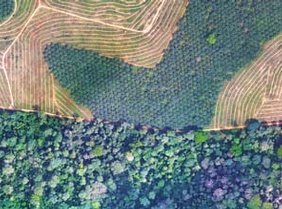
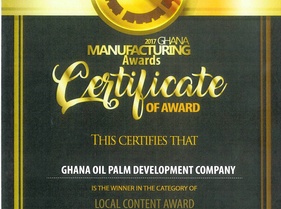
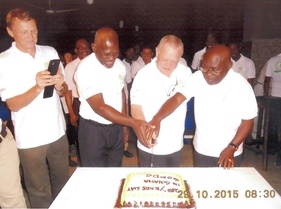
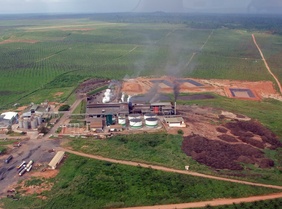
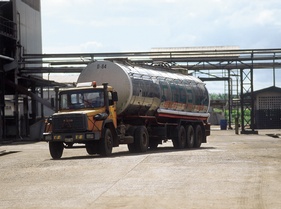
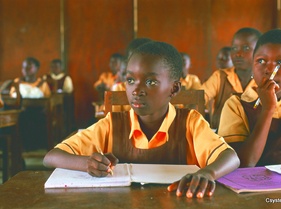
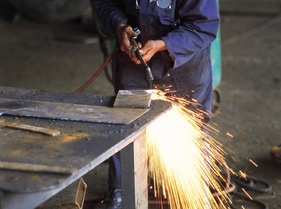
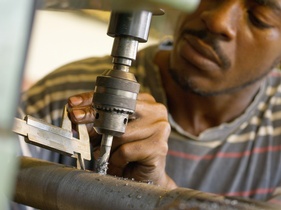
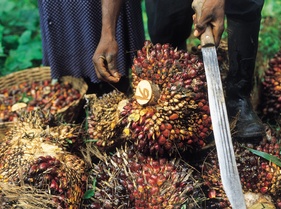
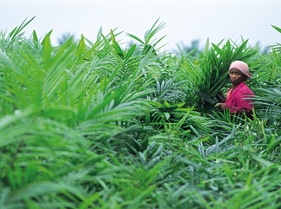
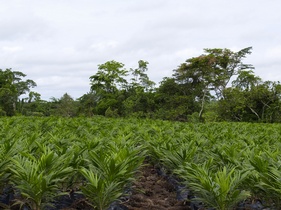
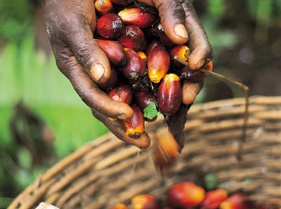
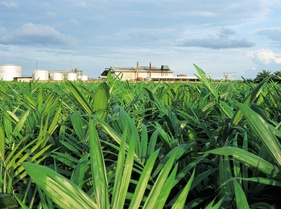
GOPDC has a deep recognition for its environmental responsibilities and is engaged in a continuous improvement of its environmental performance. An Environmental Management Plan has been drawn up and continuous efforts are made to ensure its implementation.
The Company has an environmental policy and its implementation is assured by Management Staff under the guidance of the Environmental Officer and local environmental consultants.
GOPDC strongly believes that Good Agricultural Practices (GAP) are the baseline for sustainable production of oil palm. Therefore attention is paid to the practice of zero burning, the use of cover crops (Mucuna bracteata and Pueraria phaseoloides), the technique of subsoiling in uplands, the principles of Integrated Pest Management (IPM), the practice of target fertilization, the use of EFB as an organic fertilizer, the use of cattle to graze Panicum infested lands, etc.
Below are some of the measures taken to reduce the impact of the oil palm cultivation and palm oil processing on the environment.
At the end of 2006, a CDM Emission Reductions Purchase Agreement related to the Ghana Oil Palm Methane Recovering and Fuel-Switch Project has been signed between GOPDC and EcoSecurities Group Plc.
This project has 3 components: installation of a new boiler and turbine; installation of a biodigester plant, and production of organic fertilizer. The project resulted in the production of electricity from by-products of the palm oil production, the avoidance of methane emissions into the air and the displacement of fossil fuels.
The Roundtable on Sustainable Oil Palm (RSPO) is a transparent, international, multi-stakeholder organization that was established in 2003 to address bad practices in oil palm production. The main purpose of the organization is to promote growth and use of sustainable palm oil through co-operation within the supply chain and open dialogue with its stakeholders (www.rspo.org).
RSPO projects can be seen as grouped into 3 main themes:
A) RSPO Principles and Criteria (P&C), its implementation, (field)testing and national interpretations
B) RSPO Certification Systems, its related mechanisms for certification bodies and provision of transparency in procedures relating to the supply chain
C) RSPO branding, trademark work, including issues relating to making claims by users of future certified sustainable palm oil
Based on an audit done by Proforest, WWF and GWS in 2002, some shortcomings were found that needed to be rectified in order to be able to conform with the P&C which were at that moment only drafted and not yet approved. GOPDC (Siat) had just acquired a 5,200 ha land at Okumaning and took the decision to try out the P&C in this estate to test the feasibility of them. In fact, were the first set of P&C tested against what had already been put in place in GOPDC.
In 2007 and 2008, several workshops on the RSPO P&C were held at GOPDC. In total about 350 people were trained, from all levels of the staff. During these sessions, participants were introduced to the RSPO initiative and taken through all the P&C. Participants were asked to assess GOPDC performance regarding those P&C and to make suggestions on how the company could improve to comply.
In November 2007, the Roundtable 5 (RT5) took place at Kuala Lumpur (Malaysia). GOPDC took part and presented the results of 5 years trial implementation of the P&C at the Okumaning estate.
The company led the Ghana National Interpretation of RSPO Principles & Criteria (www.rspo-in-ghana.org). A National Interpretation (NI) of the RSPO Principles and Criteria for sustainable palm oil has been approved in Ghana in 2011, the first country in Africa to receive this endorsement.
The NI paves the way for RSPO certification of oil palm growers in Ghana, setting out clear indicators for the development of sustainable palm oil appropriate to the local context.
GOPDC obtained RSPO certification in March 2015. This certificate will be valid for 5 years with surveillance audits that will take place every year.
In both estates certain parts of the concession are being conserved. In the Okumaning estate, about 15% of the total surface area is conserved and upgraded with the financial support of the DOEN Foundation. These conservation areas are also called Biodiversity Plots (BDP’s). They will act as riparian areas to attract and protect fauna and flora, but they can also protect hill tops and retain soil moisture in the area. In those BDP’s, habitat restoration activities, like reforestation with tree species that are of social and economic significance, are on-going.














